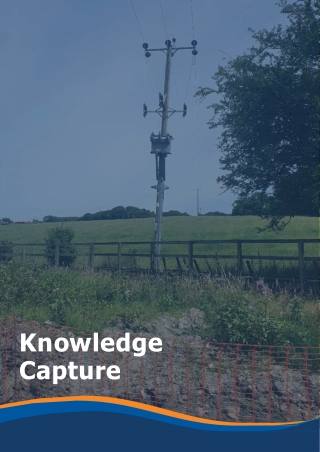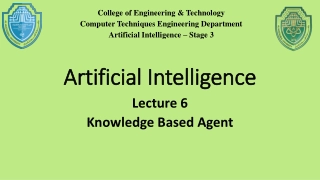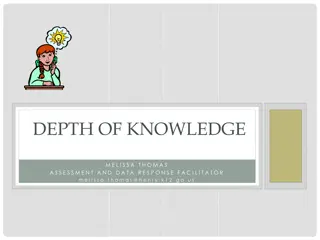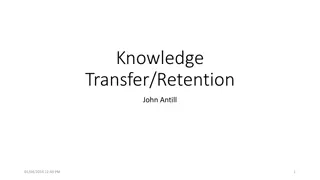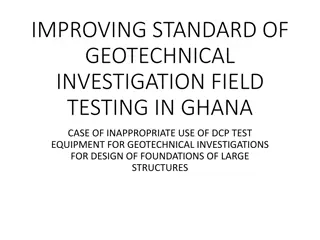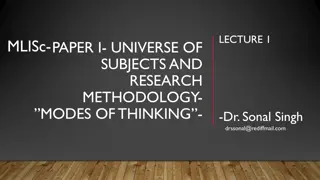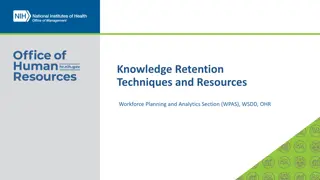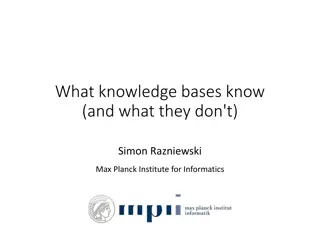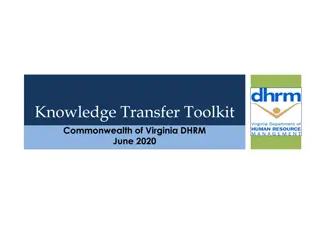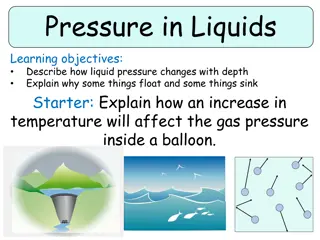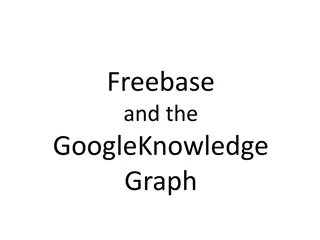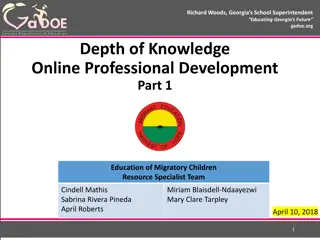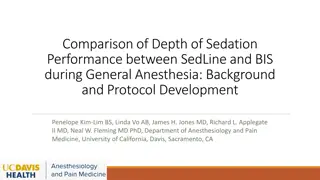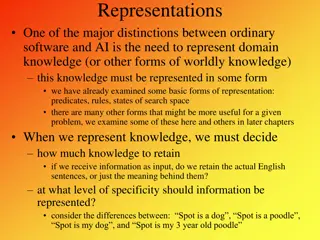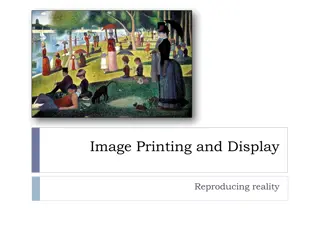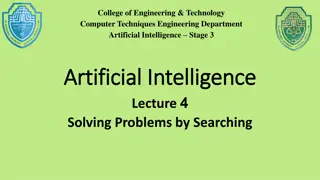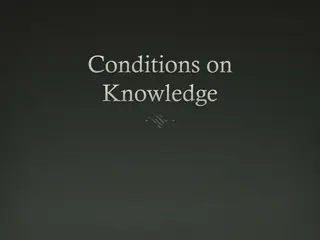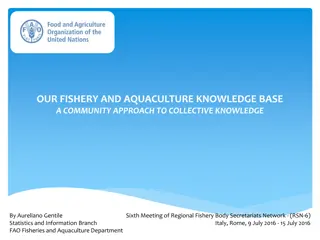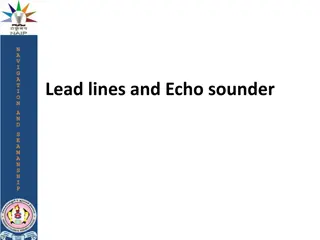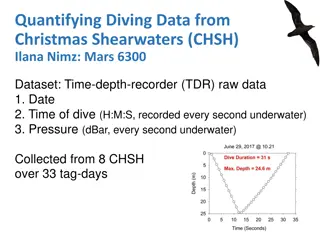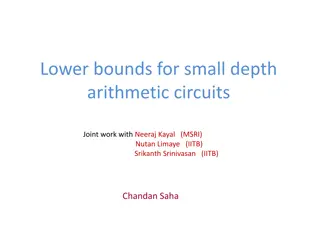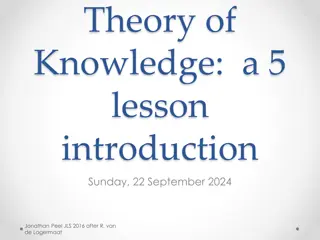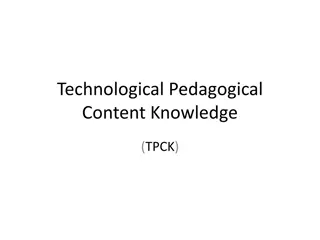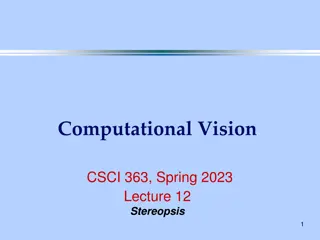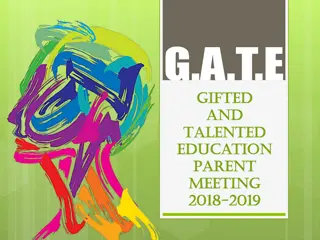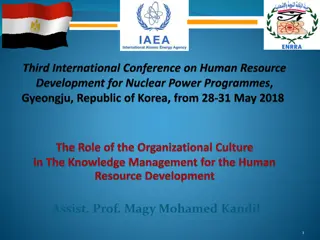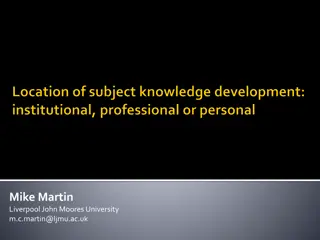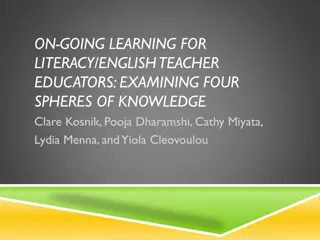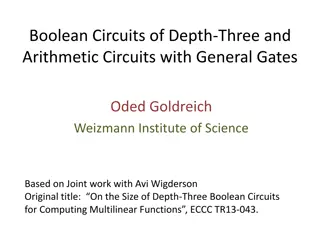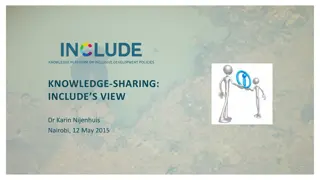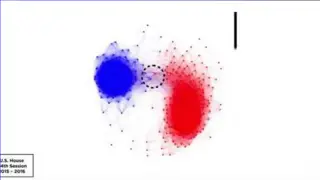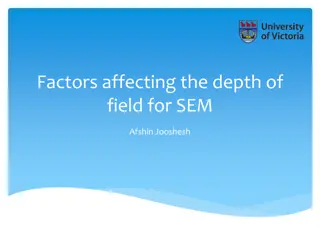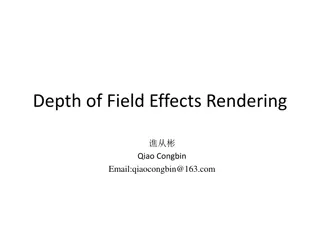Knowledge Capture
Knowledge capture is crucial for organizations to retain valuable expertise and prevent loss of critical knowledge due to employee turnover. Tacit and explicit knowledge play key roles, requiring strategic planning for retention, incentivizing knowledge-sharing culture, and implementing effective st
0 views • 6 slides
Exploring Product and Knowledge Graphs for Enhanced Information Retrieval
Dive into the world of product and knowledge graphs, uncovering the journey to a rich product graph, examples of knowledge graphs for songs, and the mission to provide comprehensive information on products and related knowledge. Discover use cases ranging from information provision to enhancing sear
3 views • 76 slides
Understanding Knowledge-Based Agents in Artificial Intelligence
Knowledge-Based Agents in AI utilize logic and knowledge representation to accept tasks, learn, and adapt to changing environments. Logic plays a crucial role in forming complex world representations and deriving actions based on inference. The central component is the Knowledge Base (KB), represent
3 views • 19 slides
Understanding Knowledge Management: Processes and Frameworks 2. In knowledge management, organizations create, share, and manage knowledge to enhance performance. It involves acquiring different types of knowledge through various means, such as perc
Knowledge Management, Organizational Objectives, Types of Knowledge, Tacit Knowledge, Explicit Knowledge
1 views • 17 slides
Depth of Knowledge
Explore the concept of academic rigor and the Depth of Knowledge (DOK) levels created by Dr. Norman Webb. DOK levels range from basic recall to extended thinking, emphasizing different cognitive skills and complexity. Rigorous learning involves deep mastery of challenging tasks, fostering critical t
5 views • 27 slides
Pedagogical Shift in Physical Science: Constructing Knowledge Through Learner-Centered Experiences
There is a significant pedagogical shift in physical science education from viewing science as a fixed body of knowledge to emphasizing the process of constructing knowledge. Learners are now placed at the center stage, engaging in inquiry-based learning, critical thinking, and collaborative interac
3 views • 21 slides
Electrical Engineering Depth Charts 2021-2022
This catalog showcases various depth charts in the field of Electrical Engineering for the academic year 2021-2022. The depth charts cover a range of topics including electric energy, electromagnetic fields, solid-state devices, bio-electrical systems, electronic circuits, and communication systems.
0 views • 11 slides
Importance of Knowledge Retention in Organizations
Organizations face negative impacts on performance due to the loss of knowledge. Strategies such as exit interviews, mentorship, and knowledge sharing tools are vital for effective knowledge retention. Assessing knowledge retention maturity through various techniques is crucial, aligning with ISO st
0 views • 11 slides
Enhancing Geotechnical Investigation Methods in Ghana for Foundation Design of Large Structures
Enhancing the standard of geotechnical investigation field testing in Ghana is crucial to ensure appropriate use of equipment like DCP for designing foundations of large structures. Objectives include assessing site suitability, obtaining design inputs, anticipating construction challenges, and esti
0 views • 31 slides
Understanding Modes of Thinking and Knowledge Development
Man's acquisition of knowledge is intricately linked to his ability to think, reason, and perceive. Knowledge is a result of experiences gained through perception, intellect, and intuition. The history of humanity is a story of knowledge acquisition and development, with man at the forefront as the
1 views • 18 slides
Effective Knowledge Retention Strategies in Workforce Planning and Analytics
Retaining knowledge is crucial for organizations to enhance customer service, foster innovation, improve efficiency, and bridge skill gaps. This article explores the significance of knowledge retention, the types of knowledge essential for succession planning, and two effective strategies - the Know
0 views • 10 slides
Exploring Knowledge Base Construction and Commonsense Knowledge in Fiction
Delve into innovative research interests focusing on knowledge base construction using fictional texts as archetypes, taxonomies for constructing knowledge bases, and extraction of commonsense knowledge from diverse sources. Challenges such as sparsity and semantics are addressed through comprehensi
3 views • 48 slides
Knowledge Transfer Toolkit for Organizational Success
This toolkit, developed by the Commonwealth of Virginia DHRM in June 2020, covers the essentials of knowledge transfer, including its definition, impact, challenges, and management strategies. It emphasizes aligning knowledge transfer with strategic goals, overcoming barriers through leadership supp
2 views • 15 slides
Understanding Pressure in Liquids: Changes with Depth & Floating/Sinking
Learn about how liquid pressure changes with depth, why some objects float while others sink, and the effects of temperature on gas pressure. Explore the arrangements of particles in solids, liquids, and gases, and understand why dams have thick walls at the base. Enhance your knowledge of internal
6 views • 14 slides
Evolution of Freebase and the Google Knowledge Graph
Freebase was initially created in 2005 as an open shared database of knowledge, later acquired by Google and absorbed into the Google Knowledge Graph. Its approach included crowdsourcing updates and additions, focusing on data rather than text. The schema of Freebase included around 1500 types, 3500
1 views • 12 slides
Understanding Depth of Knowledge in Education
Exploring Depth of Knowledge (DOK) as a key concept in education, this content delves into how DOK can enhance student engagement and critical thinking skills. Richard Woods, Georgia's School Superintendent, provides insights on applying DOK across different grade levels and content areas, emphasizi
0 views • 19 slides
Comparison of SedLine and BIS Depth of Sedation Performance in General Anesthesia
This study evaluates the performance of SedLine and BIS monitoring devices in measuring anesthetic depth during general anesthesia. The research protocol aims to compare processed EEG indices from both monitors across various levels of anesthetic depth using a custom interface box. Inclusion criteri
0 views • 10 slides
Understanding Knowledge Representation in Artificial Intelligence
In AI, representing domain knowledge is crucial and comes in various forms like predicates, rules, and search space states. Deciding the level of specificity and form of representation is key. Knowledge can be categorized into procedural, domain, and common sense knowledge, available in forms such a
2 views • 32 slides
Understanding Image Display and Halftoning Techniques
Images are reproduced for display on various devices like televisions, computer monitors, and newspapers with specific characteristics such as pixel shape, spatial resolution, and color depth. Issues with display devices, such as pixel resolution and color depth, affect fidelity. Halftoning methods,
3 views • 44 slides
Solving Problems by Searching in Artificial Intelligence: Uninformed Search Strategies
In the field of Artificial Intelligence, solving problems through searching is essential. Uninformed search strategies, also known as blind search, involve exploring the search space without any additional information beyond what is provided in the problem definition. Techniques such as Breadth-Firs
1 views • 26 slides
Exploring Epistemology: Understanding Knowledge and Truth
Epistemology delves into the nature of knowledge, understanding, wisdom, and justification, questioning the extent of human knowledge and the different kinds of knowledge. It explores skepticism and conditions on propositional knowledge, discussing whether knowledge implies truth and the debate betw
1 views • 54 slides
Navigating the World of Big Data, Knowledge, and Crowdsourcing
The world has evolved into a data-centric landscape where managing massive amounts of data requires the convergence of big data, big knowledge, and big crowd technologies. This transformation necessitates the utilization of domain knowledge, building knowledge bases, and integrating human input thro
1 views • 5 slides
Enhancing Fisheries and Aquaculture Knowledge for Sustainable Development
The Fishery and Aquaculture Knowledge Base, presented at the Sixth Meeting of Regional Fishery Body Secretariats Network, focuses on collective knowledge exchange in the fisheries and aquaculture sector. This knowledge hub offers a wealth of information on various aspects, supporting Sustainable Dev
0 views • 13 slides
Understanding Lead Lines and Echo Sounders for Depth Measurement
Dive into the world of lead lines and echo sounders for depth measurement. Discover the ancient navigational instrument, the construction of lead lines, and the markings used for different depths. Learn about the traditional use of lead lines by fishermen and the importance of these tools in shallow
0 views • 23 slides
Analysis of Diving Behavior in Christmas Shearwaters
This study aims to quantify the diving patterns of Christmas Shearwaters (CHSH) using time-depth-recorder (TDR) raw data. The analysis focuses on exploring correlations between dive profiles and time blocks standardized across three months. Data processing involved outlier removal, sample size adjus
0 views • 12 slides
Lower Bounds for Small Depth Arithmetic Circuits
This work explores lower bounds for small-depth arithmetic circuits, jointly conducted by researchers from MSRI, IITB, and experts in the field. They investigate the complexity of multivariate polynomials in arithmetic circuits, discussing circuit depth, size, and the quest for an explicit family of
0 views • 114 slides
Exploring the Nature of Knowledge in Theory of Knowledge
Delve into the essence of knowledge with Jonathan Peel's introduction to Theory of Knowledge, pondering on how different disciplines perceive knowledge, the impact of empirical questioning, and timeless wisdom on ignorance and progress. Explore the concept of basic knowledge and its implications, in
0 views • 37 slides
Understanding Modelling Knowledge and Knowledge Representation
Explore the significance of modelling knowledge through knowledge representation, making it explicit, independent, and reusable. Learn why knowledge representation is essential and how it facilitates exchange, query, inference, and visualization. Delve into examples of knowledge application in vario
0 views • 30 slides
Understanding Technological Pedagogical Content Knowledge (TPCK)
Technological Pedagogical Content Knowledge (TPCK) is a framework developed by Punya Mishra and Matthew J. Koehler that integrates content, pedagogy, and technology for effective teaching. TPCK emphasizes the interaction between these three key components to enhance technology integration in educati
0 views • 55 slides
Understanding Stereopsis: Depth Perception in Computational Vision
Dive into the fascinating world of stereopsis in computational vision, exploring topics such as binocular stereo, crossed and uncrossed disparity, angular disparity, discrimination of distances, stereo processing for depth determination, and the correspondence problem with random dot stereograms. Di
0 views • 24 slides
Understanding Gifted and Talented Education
Gifted and Talented Education (GATE) caters to students who show exceptional abilities in areas like intellectual, creative, artistic, or leadership capacities. All students should have the opportunity to learn in ways that suit their unique styles while being challenged to reach their full potentia
0 views • 17 slides
Enhancing Human Resource Development through Knowledge Management
Monitoring and improving human performance in nuclear facilities is a key challenge, with knowledge management playing a crucial role in increasing staff competence. Organizational culture influences knowledge-sharing success. Explore the components of knowledge management, its importance in nuclear
0 views • 17 slides
Understanding Subject Knowledge Development in Education
Exploring the complexities of subject knowledge development in education, this study delves into areas such as students' existing knowledge, competencies, and the role of institutions in shaping knowledge acquisition. The focus lies on personalizing knowledge to individual needs rather than a fixed
1 views • 22 slides
Examining Knowledge Spheres of Literacy/English Teacher Educators
In-depth study of literacy/English teacher educators' backgrounds, knowledge, research activities, and pedagogy. Participants from Canada, US, UK, Australia with varying years of experience. Explores knowledge of research, forms of professional development, and pedagogy in higher education.
0 views • 15 slides
Stylish And Functional Best Counter Depth Refrigerators For Small Kitchens
Find the best Counter Depth Refrigerators for small kitchens at Lahore Centre \u2013 stylish, space-saving, and efficient options from top brands like Haier and Samsung. \/\/ \/technology\/electronics\/341584-stylish-and-functional-best-counter-depth
4 views • 1 slides
Depth-Three Boolean Circuits and Arithmetic Circuits: A Study on Circuit Complexity
Explore the intricacies of depth-three Boolean circuits and arithmetic circuits with general gates, focusing on the size, structure, and complexity measures. The research delves into the relationship between circuit depth, gate types, and multi-linear functions, offering insights into circuit models
0 views • 12 slides
Knowledge Sharing and Inclusive Development Policies
Knowledge Platform on Inclusive Development Policies (INCLUDE) focuses on enhancing research utilization in policy-making to foster more inclusive development. It was established in 2012 with the aim of bridging the gap between research and policy processes in African countries. INCLUDE engages expe
0 views • 8 slides
Understanding Depth-First Search in Graph Algorithms
Delve into the world of graph algorithms and explore Depth-First Search (DFS) in both undirected and directed graphs. Learn about tree edges, back edges, forward edges, and cross edges, along with the terminology associated with DFS trees. Discover how to detect back edges and perform a depth-first
2 views • 22 slides
Factors Affecting Depth of Field for Scanning Electron Microscopy (SEM)
Understanding the factors that affect the depth of field in SEM is crucial for achieving sharp and detailed images. Factors such as the aperture size, working distance, magnification, and emission disc size play a significant role in determining the depth of field. By manipulating these factors, one
0 views • 11 slides
Understanding Depth of Field Effects in Rendering
Depth of Field (DOF) refers to the range between the nearest and farthest objects in an image that appear sharp. This article explores DOF effects in rendering, multipass approaches in graphics, and current progress in developing depth-variant filters for enhancing image clarity and focus. The goals
0 views • 9 slides
